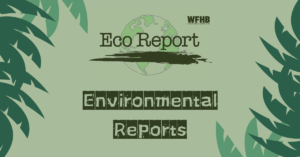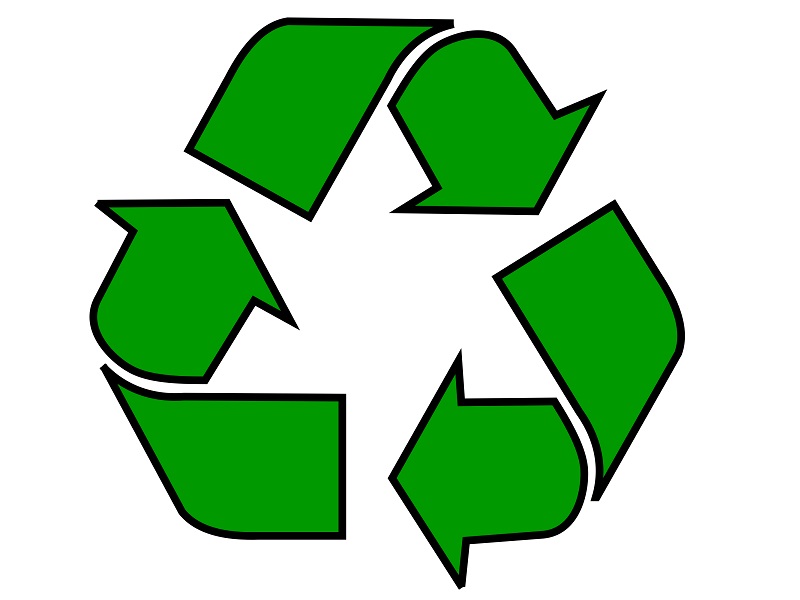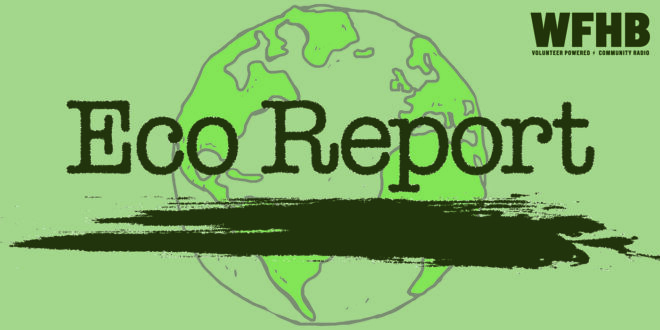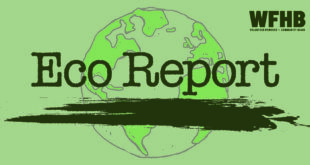Podcast: Play in new window | Download (Duration: 30:09 — 27.7MB)
In this week’s Eco Report feature we hear from Elisa Pokral, Community Outreach Coordinator of the newly rebranded Waste Reduction District of Monroe County, in a conversation with Environmental Correspondent Zyro Roze. They discuss the District’s new name, their operations, services, programs and events happening this spring.

Planting trees within cities is a popular plan to mitigate some hot zones. Here’s an example of Kansas City. Trees are being planted across Kansas City at an unprecedented pace, putting the city in the front ranks of American cities aggressively fighting climate change. An ongoing campaign to maintain Kansas City’s existing tree canopy is being broadened. Meanwhile, efforts to enhance native grasses and wildflowers across the metropolitan area are taking on new life and urgency.
Tree preservation will kick into high gear in June when a $12 million windfall grant from the U.S. Department of Agriculture reaches city coffers. The influx will enable the city to provide greater care to their existing arboreal canopy, which includes many aging trees planted after World War II. That federal infusion is in addition to money the city budgeted this fiscal year and next for its 10,000 Tree Campaign focused on heat islands in the older, poorer sections of the city, and for giving residents trees to plant in their yards.
WFHB is doing a series on ocean fishing, focusing on those species found in grocery stores. At year 1000 AD, all the oceans had billions of fish. Fishing at the time was mostly local, that is within 10 miles from port. A popular fishing method was to use a weir, essentially a v-shaped fence running parallel to the shore. At high tide, the fence was under water, at low tide the fish were trapped, so the fisherman could simply walk out and collect the fish trapped by the weir. Fishing boats were generally small enough that they could be dragged up the shore to high ground. The Vikings were brave enough to explore the high seas, and discovered Iceland and Newfoundland. The first child of European descent born in the Americas was the son of Leif Erickson. He was born at the Norse site at L’Anse aux Meadows, Newfoundland, occupied about 1021.
By 1600 AD, many European nations were fishing in the North Atlantic and Mediterranean Sea. An important fish taken from the Mediterranean was the bluefin tuna. This largest of the tuna species spawned in the Mediterranean in huge numbers. The tradition of tuna trapping began in the Mediterranean with the Phoenicians; it was improved by the Arabs around the year 1000. In the 1870s, Sicilians started packing the bluefin tuna meat in locally produced olive oil instead of preserving with salt. At that time, there were tuna operations found across Sicily. Many canned their tuna; this supported large communities of fishers and their families. Today the bluefin stock is very low in both the Mediterranean and the North Atlantic, nearing the status of “endangered”. The tv show “Wicked Tuna” is based on pursuit of the few bluefin left in the western part of the Atlantic.
Fishing in the North Atlantic by many nations occurred after 1500. Fishing pressure eased during the first half of the 20th century because of the two world wars and the Depression. By 1950, operations were again in full swing. In the 1960s the Soviet Union had developed fleets of boats to fish abundant areas around the globe. One operation was off the coast from Gloucester. The Soviets would take over 99 percent of the fish. The fleet could be seen from shore, and our fishermen were not pleased. Finally, in 1976 a bill was passed that made territorial waters 200 nautical miles out part of the nations’ fishing rights. In 1992 Canada closed the Grand Banks (east of Newfoundland) because there were few fish remaining.
The thought was the population of cod and halibut would recover in a few years. It didn’t happen. Now the cold-water species are moving north out of the Gulf of Maine because the water is too warm. There is a prediction that all the oceans will be overfished by 2050. This prediction was made 25 years ago, and events thus far suggest the prognosis is pretty accurate. In the next installment we’ll describe how the fish in the oceans can be saved.
Nine years after her 13-year old daughter, died from a rare brain tumor, Kari Rhinehart finally got the call she had been waiting for. On October 23, Dr. Michael Freedhoff, America’s top chemicals regulator, called her personally to tell her that the EPA had moved to ban trichloroethylene (TCE) – a known carcinogen that had contaminated the groundwater in Franklin, Indiana, where Rhinehart used to live. The contamination came from several sources, but notably, a nearby electrical parts plant had been using TCE as a degreaser. The chemical is also used as a spot cleaner and dry-cleaning solvent. Rhinehart believes that exposure to chemicals including TCE is what caused her daughter’s cancer – as well as the higher-than-average rate of pediatric cancer in Franklin.
Experts have found that TCE not only causes cancer, it is also toxic to the nervous system, kidneys, liver, immune system and to developing fetuses. The Environmental Defense Fund has been working for more than 10 years to get TCE off the market – providing scientific expertise to regulators and working with impacted families to educate policymakers on the dangers of the chemical. Once the EPA’s proposal is final – hopefully this year – most uses of TCE will be banned within a year.
MIT is launching an ambitious climate Center to aid policymakers. Environmentalists welcome the new initiative, but worry about potential funding and influence from fossil companies. The MIT Climate Policy Center will be part of a new and larger campus-wide initiative called the Climate Project at MIT, which aims to mobilize different parts of the university to develop, deliver, and scale up practical climate solutions as quickly as possible, according to Richard K. Lester, MIT’s vice provost. “MIT is never better than when we come together to solve big problems,” MIT President Sally Kornbluth said in a video announcing the launch of the Climate Project.
The video recalled key roles MIT played in developing radar for the U.S. military in World War II, putting the first astronauts on the moon, plugging the hole in Earth’s protective ozone layer and mapping the human genome. Tackling climate change is MIT’s most ambitious project yet, Kornbluth said. Still, some fear the university could turn to fossil fuel companies, as it has in the past, for additional funding, which could compromise the initiative’s objectives. Nathan Shwatal, a co-lead of MIT Divest, a student-led climate advocacy organization calling for the university to end its investments in fossil fuel companies, expressed cautious optimism about the new initiative. There’s great hope for the research, Shwatal said. “But there’s also a dark path that it can go down when it comes to fossil fuel funding.”
This week’s Eco Report feature is a conversation between WFHB Environmental Correspondent Zyro Roze and Elisa Pokral of the Waste Reduction District of Monroe County. They discuss the District’s new name, their operations, services, programs and events happening this spring.

-
Celebrate the upcoming Spring Equinox with a Step Into Spring Hike at Spring Mill State Park on Saturday, March 16th, from 11 am to Noon. Hike on Trail 5 to search for signs of the season. This is a rugged hike. Meet at the Lakeview Activity Center.
-
A Fun-Guy program will take place at McCormick’s Creek State Park on Saturday, March 16th, at 3 pm in the Nature Center. If you are interested in learning about the fungus among us, then you will love exploring the world of fungi.
-
Celebrate St. Patrick’s Day with a Wildflower Walk at Brown County State Park on Sunday, March 17th, from 2 to 2:30 pm. You will walk around the Nature Center gardens and woods to peek for spring wildflowers. Meet at the Nature Center.
-
Push up your sleeves and construct a home for the endangered Indiana Bat during the Build a Bat Box program at Switchyard Park Pavilion on Thursday, March 21st, from 6 to 8 pm. Indiana Bats come out of hibernation in the Spring and begin looking for summer homes. During the session as you build your box, you will learn about bats. Register at bloomington.IN.gov/parks.
-
The Sycamore Land Trust is hosting a ‘Sky Dance’ and Twilight Hike at Beanblossom Bottoms Nature Preserve on Thursday, March 21st, from 7:30 to 9:30 pm. Listen to a chorus of amphibians as you search the sky for the woodcock’s famous mating ritual, the ‘sky dance.” Registration is required.
Credits:
This week’s headlines were written by Norm Holy and Julianna Dailey.
Today’s news feature was produced Zyro Roze and edited by Kade Young.
Julianna Dailey assembled the script which was edited by the Eco Report team.
Julianna Dailey compiled our events calendar.
Kade Young and Noelle Herhusky-Schneider produced today’s show.
Branden Blewett is our engineer.
Anchors are Julianna Dailey and Robert Shull.
Are you looking for a way to make a difference on environmental issues? Eco Report is looking for reporters, engineers, and segment producers who are passionate about reporting facts on how we’re all affected by global climate disruption and the ongoing assaults on our air, land and water. We also celebrate ecologists, tree huggers, soil builders and an assortment of champions who actively protect and restore our natural world, particularly those who are active in south central Indiana. All levels of experience and all ages are welcome, and we provide the training you’ll need. WFHB also offers internships. To volunteer for Eco Report, give us a call at (812) 323-1200, or e-mail us at: [email protected].

Are you one of those people who believes our Mother Earth is getting dirtier and dirtier from all our trash? Here are a few tips to help keep the Earth cleaner.
- Stop buying Styrofoam items. Styrofoam is forever. It is not biodegradable, so instead invest in some reusable mugs that you can take with you.
- Do you like to eat salmon? Several studies have found that PCB’s, which is a class of toxic chemicals, and other environmental toxins are present at higher levels in farm raised salmon than wild salmon. Look for safe seafood when shopping for salmon.
- What about those coffee filters? Are you a coffee drinker? Dioxins, chemicals formed during the chlorine bleaching process, contaminate groundwater and air and are linked to cancer. Start buying unbleached paper filters or use reusable filters.
- We all love to go to picnics, especially when the weather is nice. The next time you host or attend a picnic, bring your own utensils and food containers. Plastic forks, spoons, straws, and all that plastic stuff you see at a picnic are not biodegradable and not recyclable.
- One more thing you might want to stop using is paper towels. Regular paper towels are bleached, and waste forest resources and landfill space. Look for recycled, non-bleached paper towels or better yet, buy dishtowels or rags to wash and reuse.
Thank you for protecting Mother Earth. Keep looking for ways you can make a difference!
 WFHB Bloomington Community Radio
WFHB Bloomington Community Radio


